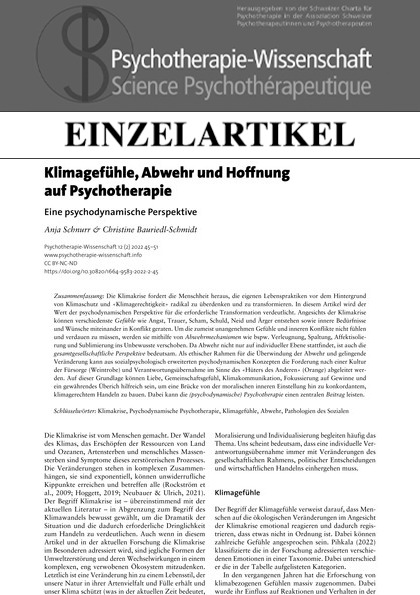Climate emotions, defense and hope for psychotherapy
A psychodynamic perspective
DOI:
https://doi.org/10.30820/1664-9583-2022-2-45Keywords:
Climate crisis, psychodynamic psychotherapy, climate emotions, defense, pathologies of the socialAbstract
The climate crisis challenges humanity to radically rethink and transform its way of life against the backdrop of climate protection and «climate justice». This article aims to clarify the value of the psychodynamic perspective for the required transformation. In the face of the climate crisis, a wide variety of feelings such as fear, sadness, shame, guilt, envy and anger can arise, as well as inner needs and desires can come into conflict with each other. In order to avoid feeling and digesting the mostly unpleasant feelings and inner conflicts, they are shifted into the unconscious with the help of defense mechanisms such as denial, splitting, affect isolation and sublimation. Since defense does not only take place on an individual level, the societal perspective is also significant. As an ethical framework for overcoming defense and enabling change, psychodynamic concepts that are enriched by social-psychological ideas can be used to derive the demand for a culture of care (Weintrobe) and for assuming responsibility in the sense of being a «guardian of the other» (Orange). On this basis, love, a sense of community, climate communication, the focus on gains and a granting superego can be helpful in building a bridge from the moral inner attitude to concordant, climate-appropriate action. Here, (psychodynamic) psychotherapy can make a crucial contribution.
Downloads
How to Cite
Schnurr, A., & Bauriedl-Schmidt, C. (2022). Climate emotions, defense and hope for psychotherapy: A psychodynamic perspective. Psychotherapie-Wissenschaft, 12(2), 45–51. https://doi.org/10.30820/1664-9583-2022-2-45
Issue
Section
Special Issue
License

This work is licensed under a Creative Commons Attribution-NonCommercial-NoDerivatives 3.0 Unported License.
This journal provides open access to its content in accordance with the basic premise that the free public availability of research benefits the exchange of knowledge throughout the world.
Authors wishing to publish in this journal agree to the following:
- The author/s retain/s the copyrights and consent/s to initial publication of the work in the journal under a Creative Commons Attribution licence, which allows third parties to use the work by citing the name/s of the author/s and this journal as initial publisher (in accordance with the Creative Commons Attribution-NonCommercial-NoDerivs 3.0 DE-Licence).
- The author/s can enter into additional contracts for the non-exclusive distribution (e.g. publish in a collection or book) of the version published in the journal, if the journal is cited as initial publisher.


